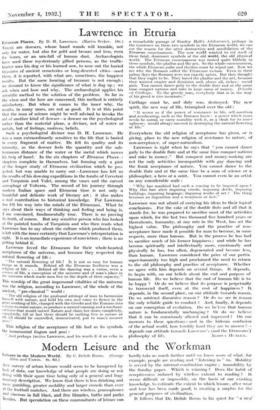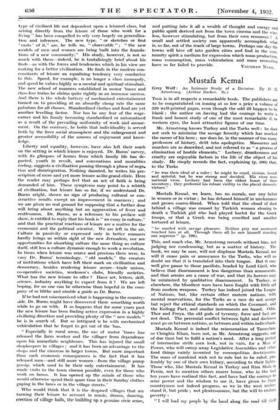Modern Leisure and the Workman A N Y survey of
urban leisure would seem to be hampered by lack of data, our knowledge of what people are doing or not doing with their spare time being only of a general and frag- mentary description. We know that there is less drinking and 1 more gambling, greater mobility and larger crowds than ever at the football matches. And there are wireless, gramophones and cinemas in full blast, and free libraries, baths and parks besides. But Speculation on these 'concomitants Of leisure' can
hardly take us much further until we know more of what, for example, people arc reading and "listening in" to. Mobility . is served by the internal-combustion engine ; immobility by the Sunday paper. Which is winning ? Does the habit of receptiveness induced by wireless extend to reading It seems difficult or impossible, on the basis of our _existing knowledge, to estimate the extent to which leisure, after wear and tear has been made good, is creating a surplus for the general purposes of civilization.
It follows that Dr. Delisle Burns in his quest for "a nevi
type of civilized life not dependent upon a leisured class, but arising directly from the leisure of those who work for a living" has been compelled to rely very largely on generaliza- tion and inference. The new type, "or sketches or first ' casts ' of it," are, he tells us, " observable " ; "the new models of men and women are being built into the founda- tions of a new community." His study, however, is not so much with them—indeed, he is tantalisingly brief about his finds—as with the forces and tendencies which in his view are making for a better civilization. He finds in the modern con- comitants of leisure an equalizing tendency very conducive to this. Speed, for example, is no longer a class monopoly, and speed he values highly as a mental and spiritual stimulant. The new school of manners established in motor 'buses and class-less trains he claims quite rightly as an immense success. And there is the whole battery of mechanized entertainment turned on to providing at an absurdly cheap rate the same pabulum for all classes. Standardized clothes and food are yet another levelling factor. Nor has he any fear of the wage- earner and his family becoming standardized or automatized as a result of the Prevailing uniformity of work and amuse- ment. On the contrary, he holds that individuality is served both by the freer social atmosphere and the enlargement and greater accessibility of the sources of enjoyment and know- ledge.
, Liberty and equality, however, have also left their mark on the setting in which leisure is enjoyed. Dr. Burns' survey, with its glimpses of homes from which family life has de- parted, youth in revolt, and conventions and moralities reeling, suggests a civilization passing through a phase of nega. tion and disintegration. Nothing daunted, he writes his pre- scription of more and yet more leisure as the grand elixir. Here the reader may perhaps feel that an act of faith is being demanded of him. These symptoms may point to a rebirth of civilization, but leisure has so far, if we understand Dr. Burns aright, shown no sign of producing cultural or con- structive results except an improvement in manners ; and we are given no real ground for supposing that a further dose will bring about anything but an aggravation of fever and restlessness. Dr. Burns, as a reference to his preface will show, is entitled to reply that his book is " an essay in culture," and that the practical reactions of leisure are a matter for the economist and the political scientist. We are left in the air. Culture in passivity or expressed only in better maamers hardly brings us within sight of the new Jerusalem, nor are opportunities for absorbing culture the same thing as culture itself, still less a culture dynamic enough to work a revolution. In times when leisure was scarce and precious there were, to vary Dr. Burns' terminology, "old models," the creators of institutions which have left their mark on civilization and democracy, besides rendering leisure secure—trade unions, co-operative societies, workmen's clubs, friendly societies. What has the new leisure to offer ? Have art, letters, skill, science, industry anything to expect from it ? We are left hoping, for no one can be otherwise than hopeful in the com- pany of so blithe and nimble a guide as Dr. Burns.
If he had not misconceived what is happening in the country- side, Dr. Burns might have discovered there something worth while to go on with. It so happens that for some years past the new leisure has been finding active expression in a highly civilizing direction and providing plenty of the "new models" he is in search of. But so intrigued is he with mechanized velticulation that he forgot to get out of the 'bus.
"Especially in rural areas, the use of motor 'buses has released the farm worker and the villager from dependence upon his immediate neighbours. This has injured the small shopkeepers in villages ; and it has been an advantage to the shops and the cinemas in larger towns. But more important than such economic consequences is the fact that it has released men—and still more women—from the village pump gossip, which used to be their only entertainment. It has made visits to the town cinema possible, even for those who work on farms. It has opened up the minds of those who would otherwise spend their spare time in their Sunday clothes gaping in the lanes or in the village streets."
Who would think that it is the despised villages that are turning their leisure to account in music, drama, dancing, erection of village halls, the building up a genuine civic sense,
and putting into it all a wealth of thought and energy and public spirit derived not from the town cinema and. the wire. less, however stimulating, but from their own resources ? A small and settled society can apparently accomplish what is, so far, out of the reach of large towns. Perhaps one day the towns will hive off into garden cities and find in the com- munity spirit a medium for expression which mass production, mass consumption, mass vehiculation and mass recreation











































 Previous page
Previous page